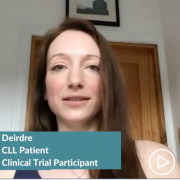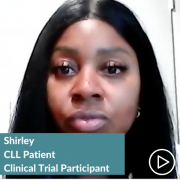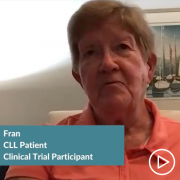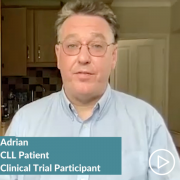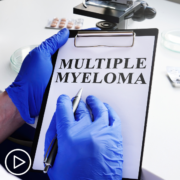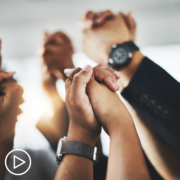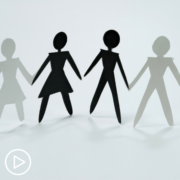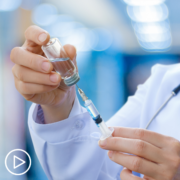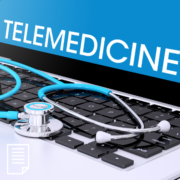Chronic Lymphocytic Leukemia: Deirdre’s Clinical Trial Profile
Chronic Lymphocytic Leukemia: Deirdre’s Clinical Trial Profile from Patient Empowerment Network on Vimeo.
Chronic lymphocytic leukemia (CLL) patient Deirdre experienced a different diagnosis and treatment path as a female CLL patient diagnosed at age 35. Watch as she shares about her patient journey, the value of clinical trials, her advice to other patients, and things she wishes she had approached differently in her CLL care.
See More from Patient-to-Patient Diverse CLL Clinical Trial Profiles
Related Programs:
Transcript:
Deirdre:
My name is Deirdre. I was diagnosed with chronic lymphocytic leukemia (CLL) at the age of 35 in 2018, and I’ve been on the medical trial in UK for the past, coming up to two-and-a-half years. I apparently had CLL for quite a number of years before I was diagnosed. It came up in through different ways, through being fatigued even after having lots of sleep, I’d feel very tired. I used to feel quite unfit. I’d get different injuries. A few of them I had to get looked at through X-rays and nothing was found, and I’d sometimes while doing arm exercises my arms felt kind of hollow and lots of different bruises which came up very easily and took ages to heal. Lots of different colds, infections and blues, which would take a lot longer than a normal person, and I just generally was feeling quite run down for a really long time. CLL wasn’t even something I’d even heard of before I was diagnosed.
Someone my age, a female, under the age of 40 was incredibly rare to have CLL. And it wasn’t until I actually had kind of a random blood that it was brought up that I had quite a high lymphocyte count. There was no real, real concern just that you should get this checked out, so it was a few months until I could see a consultant. And he said, for my age “It’s probably nothing because you’re under 40.” I had at the back of my head, my lymph node was quite enlarged, which I had actually mentioned before to my GP. I hadn’t felt very well at the time, so he just said, “Oh, it’s probably just your lymphocytes are up, and lymph nodes are nothing to be concerned about.” But, my consultant, she said, “this is a bit concerning, and you could have CLL.” And then I started with researching CLL, and I realized that all of the bullet points online were things that I’d been going through around my mid-20s to my mid-30s, so I’d had these kind of vague symptoms that all started making sense. So, when I was actually diagnosed, my oncologist, he was kind of relieved really. And I said,” Don’t worry. I know I’ve got CLL, and that’s what it was.”
So, I was diagnosed with CLL, and my oncologist said that I had accelerated CLL, which meant that I actually had to forego watch and wait. My CLL had gotten to a point where I couldn’t do that. I had to start treatment ASAP. So, I had to have a few different tests, different scans, so I could start treatment. My particular biomarkers, I was researching myself, looking at different treatments that I felt would be best for me, and I came across the FLAIR trial. I was speaking to my oncologist about how could I possibly take part in the FLAIR trial in the UK and he said have to have quite a few different tests just to see if I was a suitable candidate. I was found to be a suitable candidate for the FLAIR trial, and I was slightly hesitant, because I read that I would have to have more observation.
I actually quite liked having my CLL looked at more, so I was quite positive about starting the trial and so I got into the FLAIR trial. I was fortunate enough to be randomized into trying the two drugs that I particularly wanted that I thought would be best for me. So far, I’ve been very, very fortunate. One thing that I’ve learned through having CLL is that everyone’s CLL is slightly different. So with my particular biomarkers, I felt that the drugs that I was randomized on would be working for me, it depends on your situation, which drug would be best for you. I was very fortunate that I got on the trial, and I’m very, very happy that I’m on the trial.
I would say to people who are considering starting a trial to really speak to your oncologists, speak to your doctors.
If you can go online, there are particular CLL forums online, you can speak to quite a few other people who are on trials and ask them questions. Again, everybody’s CLL is different, so just because one drug worked for someone doesn’t necessarily mean that the drug would work in the same way for you. But, I really would recommend the trial, the care that I had from my nurses and doctors and oncologists had been amazing. I do think I’ve had such fantastic care. I do have to have maybe a few more tests to be more scans than usual, a few more biopsies, but I would have to have some anyway, and they’re actually not that bad. I think a lot of these things, I would read about them online perhaps, and sometimes they seem worse than they actually are. You imagine, them to be worse than they really are. I would really recommend, getting on to a medical trial if it’s available to you, and if you can get on the trial.
If I could go back to my pre-diagnosed self, I absolutely definitely would have said, pay more attention to how you feel your body and speak to your doctor about it, but don’t just rely on one doctor. Do keep an eye on these things, which is over many years, all these small things like knots and fatigue and bruising and everything that they all seem like it’s not connected. I wish I could go back and get checked out properly even if I maybe had to go private healthcare to get myself checked out, because deep down I knew there was something not right. And I wish I’d been a bit more confident in getting the observation that I needed to have a full blood count and have everything looked at. I wish I could go back and maybe get a second opinion.
My medical trial in total is going to be six years, and I’m very fortunate, I started actually before COVID- 19, so all the times they had to go into hospital were beforehand. I’m still on the same drugs now and I’m doing really, really good. I think everyone needs to decide for themselves and think, you know what’s best for me is a medical trial best for me or just having normal treatment, if it’s best for them. Everybody’s CLL is different, but the medical trial has been fantastic for me, and I would really recommend it to anyone who is suitable for trial.

